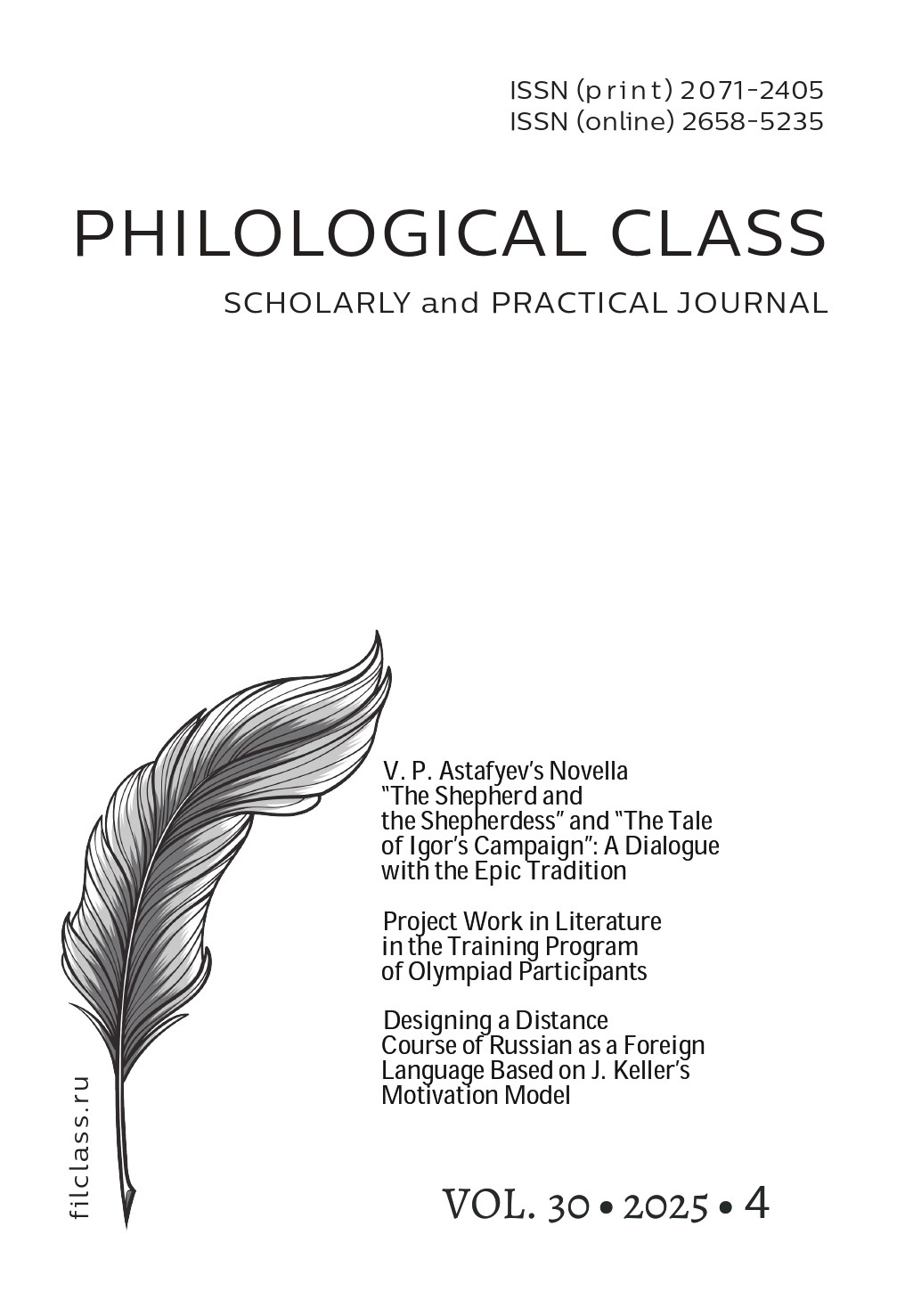Вам может быть интересно:
Архив журнала
Роли преподавателей английского языка в виртуальном и гибридном обменном проекте
- 1595
- Article: PDF
DOI: 10.51762/1FK-2021-26-03-15
Аннотация: В данной статье предлагается анализ ролей, а также соответствующие им виды знаний и компетенций, которыми должны обладать университетские преподаватели английского языка, работающие в рамках виртуального и гибридного обменного проекта – CLAVIER (Connected Learning And Virtual Intercultural Exchange Research / Исследование в области объединенного обучения и международного виртуального обмена). Указанный проект представляет собой языковой и межкультурный обмен, соединяющий трех основных партнеров – Университет Оверни (Франция), Варвик (Соединенное Королевство) и Ягеллонский университет (Польша). Проведено исследование коллаборационных заданий, выполненных французскими и польскими партнерами за 6-летний период с 2014 по 2020 годы. Учитывая проблемы, с которыми сталкивается современное образование, включая прогрессирующую цифровую революцию, жизненную необходимость онлайн-обучения, вызванную различными глобальными испытаниями последнего времени, и нарастающую тенденцию интернационализации высшего образования, автоэтнографический анализ деятельности в рамках данного проекта выявил новые функции и требования к университетским преподавателям английского языка с точки зрения их личного культурного и межкультурного опыта. Одним из выводов исследования является то, что профессия преподавателя английского языка отходит от функций языкового инструктора и предъявителя готовых знаний. Вместо этого ожидается, что востребованный в настоящем и будущем преподаватель должен фокусироваться более на заданиях, направленных на осознанную коммуникацию, на формирование среды и управление учебной деятельностью в офлайн и онлайн-пространствах, необходимо стимулировать рефлексивный анализ вовлеченности в жизнь местного или глобального сообществ. В статье разводятся понятия виртуального обмена как задействующего группы обучающихся в межкультурном онлайн-взаимодействии и совместных проектах с партнерами из других культурных контекстов и географических локаций в качестве неотъемлемого компонента образовательных программ, и гибридного обмена, который к виртуальному обмену добавляет включение офлайн-обучения и физической мобильности студентов. Таким образом, данное исследование вносит вклад в решение проблемы изменения взгляда на знания и компетенции преподавателя иностранного языка, предлагая альтернативную, расширенную структуру работы, включающую компоненты виртуального и гибридного обучения, которые на данный момент являются неотъемлемой образовательной реальностью.
Ключевые слова: Университетский преподаватель английского языка; обучение второму языку; коммуникация на английском языке; англоязычная практика; виртуальный обмен; гибридный обмен; межкультурный обмен; автоэтнография.
Для цитирования:
Клебан, М. Роли преподавателей английского языка в виртуальном и гибридном обменном проекте / М. Клебан // Филологический класс. – 2021. – Том 26 ⋅ №3. – С. 178–187. DOI 10.51762/1FK-2021-26-03-15.
For citation
Kleban, M. (2021). Academic English Language Teachers’ Roles in a Virtual and Hybrid Exchange Project. In Philological Class. 2021. Том 26 ⋅ №3. P. 178–187. DOI 10.51762/1FK-2021-26-03-15.
Об авторе (авторах) :
Клебан Марсин
Ягеллонский университет (Kраков, Польша)
ORCID ID: https://orcid.org/0000-0002-3985-392X
Сроки публикации:
Дата поступления: 30.09.2021; дата публикации: 29.10.2021.Список литературы:
Barrero, J. M., Bloom, N., Davis, S. J. (2021) Why Working from Home Will Stick. In NCBR working papers series. Working paper 28731. URL: https://www.nber.org/system/files/working_papers/w28731/w28731.pdf.
Bruhn, E. (2020). Virtual Internationalization in Higher Education. In WBV. URL: https://www.wbv.de/ shop/shop/detail/6/_/0/6/6004797w/facet/6004797w///////age/360.html?cHash=07eca8249083631c17cf9aa0209c03 d4#single-cd2dfc9c1c663e83.
Cohen, L., Manion, L. & Morrison, K. (2018). Research Methods in Education. London & New York, Routledge.
Eberhard, D. M., Simons, G. F., Fennig, Ch. D. (Eds.). (2021). Ethnologue: Languages of the World. Twentyfourth edition. Dallas, Texas, SIL International. URL: http://www.ethnologue.com.
Ellis, C., Adams, T. E. & Bochner, A. P. (2011). Autoethnography: an Overview. In Historical Social Research. Vol. 36. Issue 4, pp. 273–290. URL: https://doi.org/10.12759/hsr.36.2011.4.273-290.
Ensor, S., Kleban, M. & Rodrigues, C. (2017). Telecollaboration: Foreign Language Teachers (Re)Defining Their Role. In Alsic. Vol. 20. Issue 2. URL: https://doi.org/10.4000/alsic.3140.
Gaebel, M., Zhang, T., Bunescu, L. & Stoeber, H. (2018). Trends 2018. Learning and Teaching in the European Higher Education Area. Brussels, Belgium, EUA.
Harmer, J. (2001). The Practice of English Language Teaching. Harlow, Pearson Education.
Kachru, B. (1985). Standards, Codification and Sociolinguistic Realism: English Language in the Outer Circle. In Quirk, R. and Widowson, H. (Eds.). English in the world: Teaching and learning the language and literatures. Cambridge, Cambridge University Press, pp. 11–36.
Kleban, M., Ensor, S. and Blanchard Rodrigues, C. (2021). Hybrid Pedagogical Design in an International Exchange Project. In: Brassier-Rodrigues, C. and Brassier, P. (Eds.). Internationalisation at Home: A Collection of Pedagogical Approaches to Develop Students’ Intercultural Competences, pp. 55–77.
Knight, J. (2003). Updating the Definition of Internationalization. In International Higher Education. Vol. 33 (Fall 2003), pp. 2–3. URL: https://doi.org/10.6017/ihe.2003.33.7391.
MacKinnon, T. (2016). The Clavier Network. In O’Dowd, R. & Lewis, T. (Eds.). Online Intercultural Exchange: Policy, Pedagogy, Practice (1st ed.). Routledge, pp. 235–240. URL: https://doi.org/10.4324/9781315678931.
Mishra, P. & Koehler, M. J. (2006). Technological Pedagogical Content Knowledge: a Framework for Teacher Knowledge. In Teachers College Record. Vol. 108. Issue 6, pp. 1017–1054.
O’Dowd, R. (2018). From Telecollaboration to Virtual Exchange: State-of-the-Art and the Role of UNICollaboration in Moving Forward. In Journal of Virtual Exchange. Vol. 1, pp. 1–23. URL: https://journal. unicollaboration.org/article/download/877/183.
Sato, S. (2020). Language Education for the Social Future. In Electronic Journal of Foreign Language Teaching. Vol. 17, pp. 16–24.
Sharma, S. R. (2015). Role of Universities in Development of Civil Society and Social Transformation. In Proceedings of International Academic Conferences 2604181, International Institute of Social and Economic Sciences. URL: https://ideas.repec.org/p/sek/iacpro/2604181.html.
Shulman, L. (1987). Knowledge and Teaching: Foundations of the New Reform. In Harvard Educational Review. Vol. 57. Issue 1, pp. 1–22.
Zawadzka, E. (2004). Nauczyciele języków obcych w dobie przemian. Kraków, Impuls.


